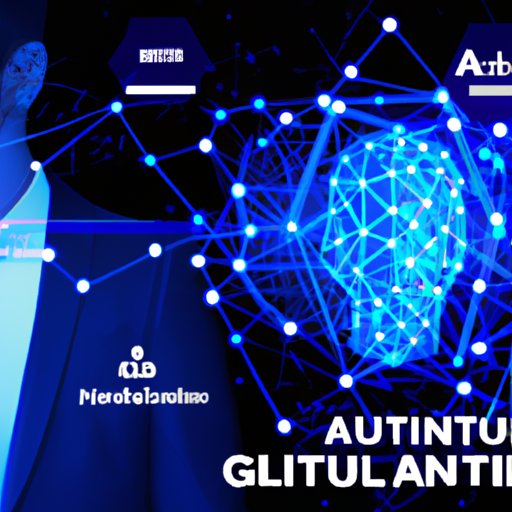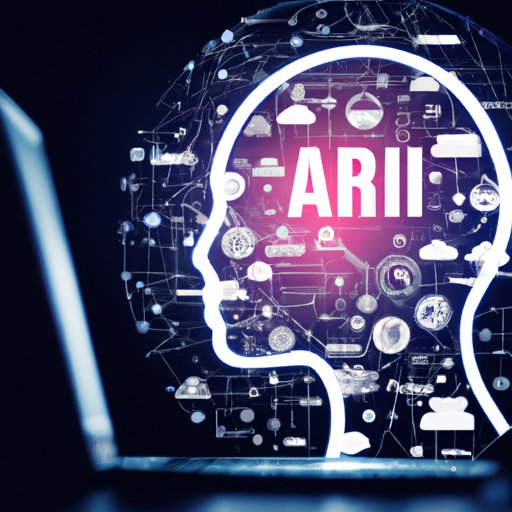Introduction
As technology advances, so do the threats to its safety. Cybersecurity is an ever-evolving field that deals with protecting networks, systems, and data from malicious attacks and unauthorized access. With the rise of artificial intelligence (AI) in recent years, its use in cybersecurity has become increasingly important. In this article, we will explore how AI is changing the landscape of cybersecurity and examine its impacts on detecting and preventing cyberattacks, enhancing data security, and automating manual processes.
Examining the Impact of AI on Cybersecurity
AI has become an integral part of the cybersecurity landscape due to its ability to detect and prevent cyberattacks more efficiently than traditional methods. AI-based solutions are capable of identifying suspicious activity and can respond quickly to potential threats. Additionally, AI can be used to enhance data security by analyzing large amounts of data to detect anomalies and protect against malicious actors.
Another major benefit of using AI for cybersecurity is its ability to automate manual processes. This can help reduce costs and increase efficiency by eliminating the need for human involvement in certain tasks. AI can also be used to analyze user behavior and alert security teams when there is suspicious activity or a breach.

Exploring the Use of AI in Detecting and Preventing Cyberattacks
In order to effectively detect and prevent cyberattacks, AI-based solutions rely on machine learning algorithms to identify patterns and behaviors associated with malicious activity. These algorithms can be trained to recognize known threats as well as uncover new ones. Additionally, AI can be used for anomaly detection, which involves identifying unusual patterns or activities that could indicate a potential attack.
The use of AI in cybersecurity also extends to natural language processing, which allows computers to understand and respond to human language. This can be used to detect phishing emails or other forms of social engineering attacks. Natural language processing can also be used to automatically generate security reports, which can help security teams stay up to date on the latest threats.
Looking at the Benefits and Challenges of AI-Based Cyber Security Solutions
Using AI for cybersecurity offers several advantages over traditional methods. AI-based solutions can provide increased accuracy in identifying threats, as well as improved response times. Additionally, AI can reduce costs by automating manual processes and eliminating the need for human involvement.
However, implementing AI-based solutions can be complex and costly. Additionally, these solutions may require significant time and resources to train and maintain. As such, organizations must carefully evaluate their needs before investing in AI-powered cybersecurity solutions.
Analyzing the Advantages and Disadvantages of AI-Powered Cyber Security Systems
The use of AI-powered cybersecurity systems can provide organizations with improved security measures. AI-based solutions can detect threats more quickly and accurately than traditional methods, allowing organizations to stay ahead of potential threats. Additionally, AI-based solutions can automate manual processes and reduce costs.
However, there are some potential ethical implications of using AI for cybersecurity. AI-based solutions can be used to monitor user behavior, raising privacy concerns. Additionally, AI-powered cybersecurity systems can be vulnerable to malicious actors who may attempt to exploit them for their own gain.

Investigating How AI is Changing the Landscape of Cyber Security
AI is rapidly changing the way organizations approach cybersecurity. AI-based solutions can detect and prevent cyberattacks more quickly and accurately than traditional methods. Additionally, AI can be used to automate manual processes and enhance data security. However, organizations must consider the potential ethical implications of using AI for cybersecurity.
The use of AI in cybersecurity has created new security challenges that organizations must address. As AI-based solutions become more advanced, organizations must stay ahead of potential threats in order to remain secure. The use of AI in cybersecurity provides organizations with improved security measures, but it also creates new challenges that must be addressed.
Conclusion
AI is quickly becoming an essential tool for cybersecurity. AI-based solutions can detect and prevent cyberattacks more quickly and accurately than traditional methods, as well as automate manual processes and enhance data security. Organizations must consider the potential ethical implications of using AI for cybersecurity, while also staying ahead of potential threats. AI is transforming the landscape of cybersecurity and is likely to continue to do so in the future.
(Note: Is this article not meeting your expectations? Do you have knowledge or insights to share? Unlock new opportunities and expand your reach by joining our authors team. Click Registration to join us and share your expertise with our readers.)
